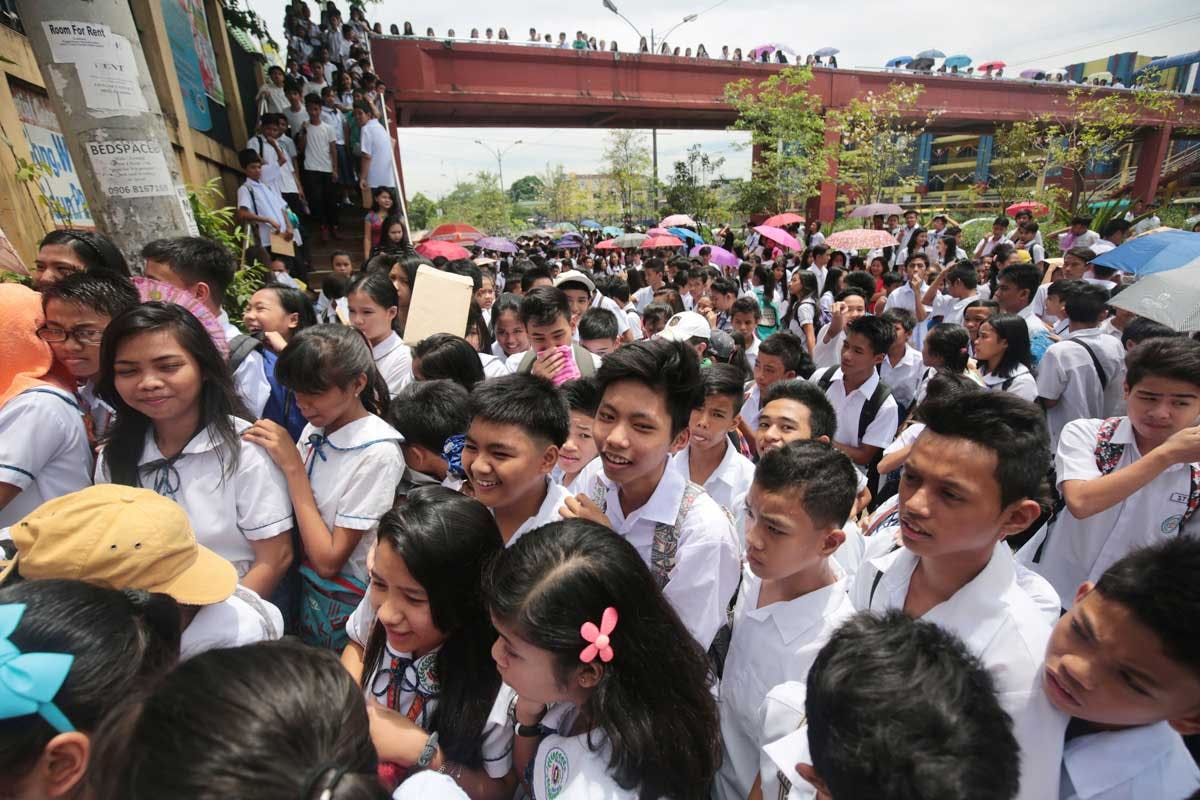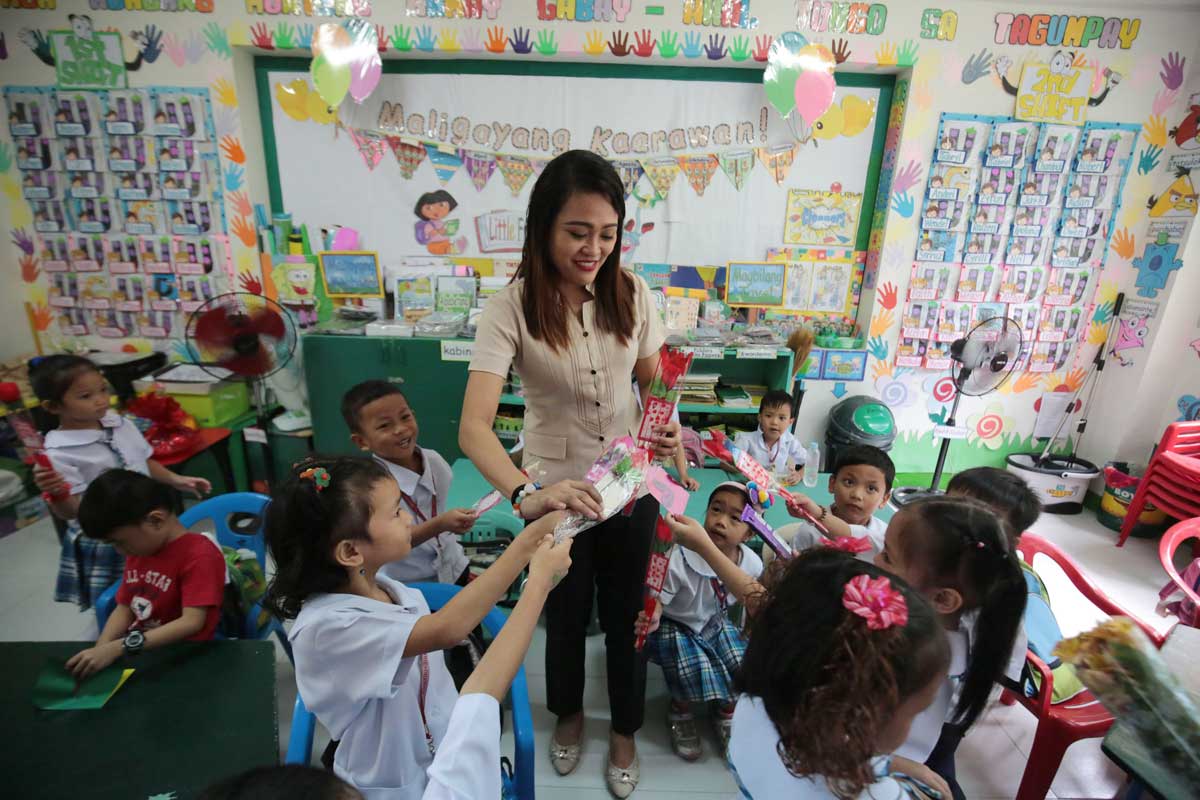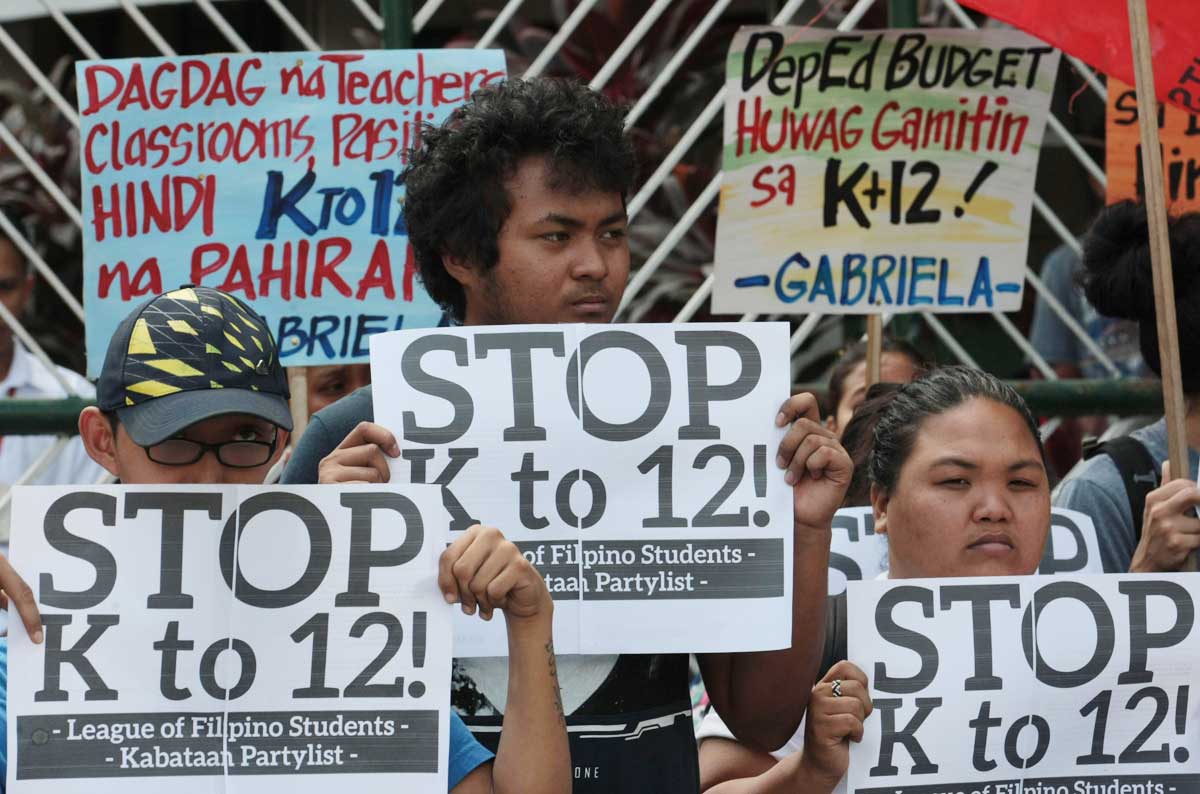The Department of Education agrees that the K to 12 program should be reviewed, but only to improve its implementation and not scrap it as some groups want.

The plan of the House of Representatives to review the implementation of the K to 12 Basic Education Reform Program has renewed calls for a revamp, if not the total abolition, of the senior high school program.
The review is long overdue, according to Alliance of Concerned Teachers (ACT) secretary general Raymond Basilio, who said that the K to 12 program “has only managed to worsen the crises in the Philippine educational system.”
“The addition of two years in basic education has only resulted (in) worse shortages in the educational system given the government’s consistent tack to scrimp on the education budget,” he said.
For the Federation of Associations of Private School Administrators (FAPSA), the program –implemented during the previous administration – has failed to live up to its promise.
FAPSA president Eleazardo Kasilag cited various problems, such as the supposed lack of coordination between the Department of Education (DepEd), the Commission on Higher Education (CHED) and the Technical Education and Skills Development Authority in implementing the program.
“They are supposed to facilitate graduates… but students now just switch courses, making the senior high school tracks ineffective since they are not considered prerequisites in tertiary courses as initially promised,” he said.
He also noted the impact of K to 12 on private schools, citing several that have shut down supposedly due to the additional burden brought about by the program.
His proposal? Make K to 12 optional for private schools.
Kasilag said they are optimistic that their graduates would still be ready for college even without the additional two years.
But such proposals have yet to gain ground.
Even policymakers who have expressed dissatisfaction with the implementation of K-12 have yet to publicly call for the abolition or a major revamp of the program.
Speaker Alan Peter Cayetano, who expressed concern over the job readiness of K-12 graduates, said the House of Representatives would initiate a review of Republic Act (RA) No. 10533 or the Enhanced Basic Education Act of 2013, which instituted the reform.
“We in the House are of the consensus that K to 12 is not living up to its promise, which is, after you finish senior high school, you don’t have to go to college. You gain skills to be employed,” he said.
“Many schools still lack equipment, whether it is automotive, electrical or sports. So there are issues that we have to address,” Cayetano added, citing problems in the implementation of the technical-vocational-livelihood (TVL) track in senior high school that is supposed to prepare students for employment.

Since the previous Congress, the Makabayan bloc has been calling for a review of the program.
On the first day of the 18th Congress in July, party-list representatives France Castro (ACT Teachers); Carlos Isagani Zarate, Ferdinand Gaite and Eufemia Cullamat (Bayan Muna); Sarah Elago (Kabataan) and Arlene Brosas (Gabriela) re-filed House Resolution No. 20 calling for an inquiry in aid of legislation on the status of the K to 12 implementation.
They cited issues faced by the DepEd in the implementation of the program, including shortages of classrooms, facilities, learning materials and equipment.
The lawmakers also noted the statements from business groups on the supposed lack of job readiness or competence for employment of the first batch of senior high school graduates.
In September, Pasig Rep. Roman Romulo – who was among those who pushed for the passage of the Enhanced Basic Education Act – filed House Resolution No. 335 calling for the conduct of a similar inquiry.
Among the reasons he cited was a study conducted by the Philippine Institute for Development Studies, which indicated inadequate preparation for the full implementation of the program, as well as the gaps in the tracks offered in public and private schools.
Weeks after Cayetano called for the review, Sorsogon Rep. and Deputy Speaker Evelina Escudero also filed House Resolution No. 437, which aims to direct the House committee on basic education and culture to conduct an inquiry in aid of legislation on the implementation and policy effectiveness of K-12.
Escudero noted that the joint congressional oversight committee that should have been created to monitor the implementation of the K to 12 program has yet to be convened.
The three resolutions, currently pending before the House committee on rules, stressed the need for a review to enable Congress to assist the DepEd in achieving the objectives of the K to 12 program.
The pending proposals in the lower House follow a similar move conducted by the Senate.
Sen. Sherwin Gatchalian, said the quality of education in the country remains low five years after the passage of RA 10533.
He called for measures to improve the basic education system after the Senate panel found that Grades 6 and 10 students scored low in the National Achievement Test held for the school year 2016 to 2017.
“We have to review the K to 12 curriculum. We have to review if the technical-vocational skills being taught under the K to 12 are the skills that the industry needs,” the senator was quoted as saying in a BusinessWorld report. “We have what we call a misalignment between what the industry needs and what is being taught in the K to 12.”

Review welcome
The DepEd, which is conducting its own review of the program, has welcomed the proposed to review its implementation, expressing hope that this would spur renewed commitment from stakeholders to achieve the goals of K to 12.
“Congress and the DepEd have worked closely together since the previous budget hearings to address the issues of the K to 12 program,” the agency said in response to Cayetano.
“A dedicated review session will provide an appropriate venue to comprehensively discuss concerns about the program and plot out corresponding solutions,” it added.
Earlier, the agency stood by its position that the program is a necessity and halting it “might prove detrimental to the accelerating and increasing demands in education.”
“The challenges still abound but the support of the national and local government, and of stakeholders in the private sector and the community, has been so overwhelming that it silences doubts and strengthens the resolve to move forward with change today,” it said in a statement last May in which it denied rumors that it would stop the senior high school program.
“As with any law, the implementation, amendment, expansion or repeal of the K to12 program is within the ambit of the legislative branch of the government, comprised of the Senate of the Philippines and the House of Representatives,” it added.
Despite challenges, the DepEd said the K to 12 program has resulted in numerous gains for the basic education system, including the high enrollment and transition rates in senior high school.
Former education undersecretary Dina Ocampo, in an article for OneNews.PH, also underscored the impact of the K to 12 program on the Filipino students.
The CHED likewise welcomed the proposed legislative review, with its chairman J. Prospero de Vera III saying it would answer questions such as those concerning subjects like Filipino.
“We would like to know how it is being taught in senior high and if there is a need to strengthen the teaching of language in the university level. We need to study the data,” he pointed out.
De Vera said they hope the review will produce data that will guide them in making policies at the higher education level.
“We want to find out the level of competency of senior high graduates because this will be used by the accepting universities to accept students,” the CHED chief said.
“What is happening now is that all the universities have their own admission tests. If there is an equivalent of SAT (Scholastic Assessment Test) in high school, that can be used by the universities to complement their admission tests. It would be easier to determine what are the competencies of the applicants,” he added, referring to the pre-college standardized tests implemented in the United States.
(Edited by JULIUS JAY JR B. DASKEO - original submission Monday, 17 April 2023, 10:19 AM)